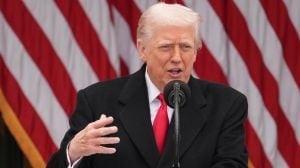We’re buying, can we sell?
Mittal’s conquest is great, but India needs to prove it is for two-way globalisation

Twelve years ago I passed by a tiny Belgian mountainside town called Huy to write about an Indian steel success story. Titagarh Industries’ takeover of the ailing Delloye mill was then a symbol of Indian ambitions to make a mark in Europe, with the Kolkata-based company emerging as an early example of global ambition. The assets of the steel product unit have been since sold off, and Titagarh Industries is in trouble, but one would have hardly imagined that a nation’s dream would grow so big and turn real so fast. Lakshmi Mittal — albeit running a European company — has dared to create the world’s biggest steel giant by merging his group with Luxembourg’s Arcelor. Understandably, this is a rah-rah moment for Indian nationalists and globalisers alike to sing the praise of India’s entrepreneurial spirit and the joys of embracing globalisation.
But I would say two cheers to that. Globalisation and economic nationalism can make for strange bedfellows.
For those brought up on stories of the East India Company and British colonial role, the conquest of Arcelor by Mittal, has a fairy tale charm about it, and more so because Europe has had a history of cultural conservatism and protectionist urges in its quest to embrace free-market policies. However, we would do well to remember India’s own clunky track record in mergers and acquisitions.
First, a bit about Europe. Thatcherite Britain and a European Union overseen by self-avowed commitments to free-market policies policed by the WTO have evolved surely but steadily into an integrated global economy, but pockets of resistance remain. Europe’s own quota regime for apparel imports from developing countries and the painful path to easing textile trade involved a long battle. The more ponderous amongst us would argue that quality-based criteria such as the ISO 9000 norms, or environmental and social standards linked to labour, also effectively serve as protectionist trade walls in the steeling of ‘Fortress Europe’. Immigration laws have their own degree of implicit protectionism or worse, xenophobia. After all, was it not a German politician who was accused of racism five years ago when he ran for provincial elections on the slogan of “Kinder Stat Inder” (kids, not Indians) to keep away Indian software programmers?
In the Arcelor battle and in other episodes, there are shades of grey in the green channels on offer in Eu rope, but perhaps now is not a bad time to make sure India itself does not practise double standards.
Since P.V. Narasimha Rao kicked off sweeping reforms in 1991, globalisation is a well-accepted theme, but ground realities have time and again suggested that a political and social fabric stands in the way, despite assertions that a political consensus has been reached on them. The truth is that there are no major steps backward, but stalling new measures are on.
In the early 1980s, much before liberalisation began, India got a taste of nationalist excess when parliamentarians and industry captains closed ranks against the efforts of NRI Swaraj Paul’s Caparo group to control Delhi-based Escorts and DCM. Government-controlled financial institutions got fashionably tagged as FIs after the episode, and emerged as a new power centre — thereby showing the indirect but strong clout Indian political leaders have in running corporate affairs. FI power was evident later when the Ambanis tried in vain to take control of Larsen & Toubro. Non-resident Manu Chhabria was luckier than Paul in dealing with domestic lobbies when he got control of Shaw Wallace and other companies, but it became quite evident that politics hung somewhere within the corporate system.
An acid test came in the mid-1990s when Britain’s BAT plc, the original parent of ITC, tried in vain to wrest management control of the tobacco-to-hotels conglomeration. India was committed to reforms by then, but it did not stop K.L. Chugh from playing a nationalist martyr as he refused to resign as chairman. BAT was forced to arrive at a middle ground and not push for majority control. India’s nationalist sentiments were more than evident in the public discourse at that time and the FIs did not budge.
Mittal, like BAT, has yielded to the middle ground though he has gained much more. His decision to allow Arcelor’s board to have a big say in the post-merger European company, his acceptance of a minority 45 per cent stake, and the sharing of the new entity’s chairmanship are all clear indicators of a power-sharing arrangement played out as a corporate merger. Ideally, both the ITC and Arcelor battles could be seen as similar conflicts, but Indian opinion and the political leadership have effectively taken a nationalist stance in both cases.
There are nuances, of course. Finance Minister P. Chidambaram maintained a studied silence on the Arcelor battle, and is content to just laud India’s entrepreneurial spirit, but Commerce Minister Kamal Nath has talked about globalisation being a two-way street. It should be, of course, but we are entitled to ask if he would make that a lasting commitment.
True enough, friendly takeovers are now easily allowed in India. American white goods maker Whirlpool moved ahead in India by steamrolling the Kelvinator brand and acquiring its factory, and Sweden’s Electrolux is expanding after taking over a facility owned by Maharaja International. Coca-Cola Company now controls Thums Up, the brand once associated with India’s national pride in the cola war against the entry of Pepsi.
But true political will is shown when leaders stay neutral in hostile battles. India’s track record in this is not clear yet. Closer home, after the display of significant political tenacity, VSNL and CMC are now part of the Tata fold and Reliance has acquired IPCL, but ceding of management control in companies like HPCL or BPCL is not on the horizon. Even minority stakes are difficult to sell in many public sector companies when the government is run by an alliance in which Marxists call the shots on key reform initiatives. Trade unions still dominate the discourse on public sector companies. In such a context, talk about Indian entrepreneurial spirit can make for quickfix national pride, but a bit of introspection can help. How far is India from allowing a simple and smooth takeover of a public sector company, even by a domestic group? How far are Indian financial institutions from allowing a foreign firm to buy an Indian company by going over the heads of its management?
As songs are sung in praise of Mittal’s European conquest, those are the $32 billion questions.
madhavan.nexpressindia.com


- 01
- 02
- 03
- 04
- 05





























